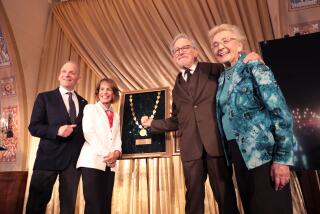Soviet Scholars Liken Anti-Zionism Drives to Nazi Anti-Semitism
- Share via
MOSCOW — The Soviet Union’s past propaganda campaigns against Zionism were strongly criticized here Thursday by two Soviet historians who compared them to Nazi anti-Semitism and blamed them for the emigration of tens of thousands of Jews.
The campaigns against Zionism, which is still criticized here on an ideological basis, were so strident and vicious, the historians argue, that they fostered widespread anti-Semitism within Soviet society and have made Jews a target for Russian ultra-nationalists today.
“The time has come to think at last about the reasons why tens of thousands of Jews relinquished their Soviet citizenship and emigrate to other countries, including Israel in the past 20 years,” Sergei Rogov and Vladimir Nosenko wrote in a lengthy article in the Communist Party newspaper Soviet Culture.
Cultural Center Opening
The article, the latest in a series of official moves recognizing the legitimacy of Jewish “national interests,” was published on the eve of the opening here of a Jewish cultural center, the first in Moscow since dictator Josef Stalin began a purge of Jews as “rootless cosmopolitans” in the late 1940s.
In recent months, the government has encouraged the formation of Jewish cultural groups and theater troupes; it has agreed to the establishment here of a center of Jewish studies that will educate a new generation of Soviet rabbis, and it has permitted Soviet Jews to begin forming official links with world Jewry.
The new Moscow cultural center, which will have a library in Hebrew and Yiddish, offer lessons in both languages and provide a home for a theater group, will open Sunday with the participation of Elie Wiesel, the 1986 Nobel Peace Prize laureate, Edgar M. Bronfman, president of the World Jewish Congress, and Yehuda Amichai, Israel’s leading poet. An exhibition on the Holocaust, the first in the Soviet Union, is being presented by the Simon Wiesenthal Center of Los Angeles.
The Moscow center is named after Solomon Mikhoels, director of a Yiddish theater company. The company was closed in 1949 with the arrest of many of its actors after Mikhoels was killed in an automobile crash, which historians here now say was probably a murder by the security police.
The government, at the same time, is allowing increasing numbers of Jews to emigrate, including many who had long been denied permission to leave. Last year, 20,082 Jews emigrated, according to the Geneva-based Intergovernmental Committee for Migration, and 2,616 left last month.
The article in Soviet Culture appeared to be intended to provide a political framework for these changes by criticizing past policies in unusually sharp terms.
The past attacks on the Zionist movement, which Moscow continues to view as chauvinistic and reactionary, had failed to distinguish it from “the development of Jewish national self-expression, including Jewish culture in the Soviet Union,” the two historians say. As a result, many of the country’s 2 million Jews were alienated, and many decided to leave.
“The creation of mistrust and suspicion around Jews is much more effective in arousing the desire to emigrate than any calls to leave ‘for the promised land,’ ” Rogov and Nosenko write.
They strongly criticized a leading anti-Zionist, Vladimir Begun, who set the tone for much official propaganda, as “seeking to sow mistrust toward Soviet Jews,” and they compare his views on Zionists to those of Adolf Hitler on Jews.
Quoting from Begun’s writings and from the Nazi leader’s “Mein Kampf,” they say, “The only difference is that Hitler writes about Jews and Begun about Zionists. . . .
“But since in (our) propaganda, the borderline between the concept of ‘Zionist’ and ‘Jew’ was frequently blurred, the camouflage to which Begun resorts is totally transparent.”
In their attack on Begun, the two historians from the Soviet Academy of Sciences say that he and others in past anti-Zionist campaigns had “powerful backers” and imply that the resulting anti-Semitism thus amounted to official policy.
More to Read
Sign up for Essential California
The most important California stories and recommendations in your inbox every morning.
You may occasionally receive promotional content from the Los Angeles Times.













